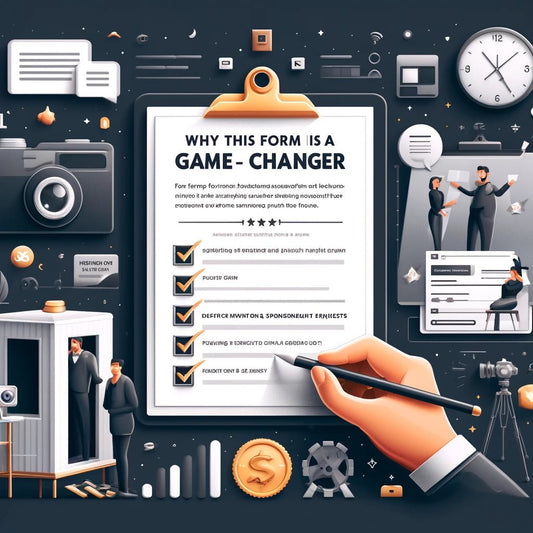
Boost Your Business's Success with Effective Corporate Event Marketing Strategies
Share
.jpg)
Corporate event marketing plays a crucial role in the success of businesses by creating valuable opportunities to connect with clients, customers, and industry partners. It involves planning and executing a variety of events to promote a company's products, services, and brand. The importance of corporate event marketing cannot be underestimated as it offers numerous benefits to businesses.
Corporate events provide a platform for businesses to showcase their offerings, establish industry leadership, strengthen relationships with stakeholders, and generate leads. Such events help in enhancing brand image and reputation while creating a positive impression in the minds of attendees. Corporate event marketing helps businesses stand out from the competition and establish a unique identity.
There are different types of corporate events, each serving a specific purpose. These include product launch events, conferences and seminars, trade shows and exhibitions, corporate retreats and team-building events, and charity and CSR events.
Planning a successful corporate event involves several steps, including defining event goals and objectives, creating a budget, selecting the right venue, designing an engaging event program, promoting the event, and ensuring smooth execution and logistics.
Measuring the success of corporate event marketing is essential to evaluate its effectiveness. Key metrics such as attendee engagement, leads generated, sales conversions, and return on investment (ROI) can help assess the impact of the event. Collecting feedback and conducting post-event analysis are also crucial for continuous improvement and future planning.
Corporate event marketing is continually evolving to adapt to changing trends and preferences. Incorporating technology in events, embracing virtual and hybrid event formats, personalizing and customizing experiences, and adopting sustainable event practices are some of the prominent trends in this field.
By leveraging corporate event marketing strategies, businesses can create impactful and memorable experiences that drive growth, foster relationships, and contribute to overall business success.
What is Corporate Event Marketing?
Corporate event marketing, also known as corporate event planning and execution, is a strategic approach used by businesses to accomplish their marketing goals. This technique involves organizing various events such as product launches, conferences, trade shows, and sponsorships. Its primary objective is to enhance brand exposure, engage with customers, generate sales leads, and ultimately boost revenue. Effective corporate event marketing entails meticulous planning, identification of target audience, budget management, efficient event logistics, and seamless communication. By creating remarkable experiences for attendees, organizations can enhance brand reputation, foster customer and partner relationships, and drive business expansion. In a nutshell, corporate event marketing acts as a potent tool for businesses to display their offerings, services, and principles to a wider audience.
The Importance of Corporate Event Marketing
The Importance of Corporate Event Marketing cannot be understated. It plays a vital role in the success and expansion of businesses. This form of marketing offers unparalleled chances to promote products or services, engage with customers, and enhance brand awareness. There are several key reasons why corporate event marketing is crucial:
- Networking: Corporate events serve as valuable platforms for businesses to connect with potential clients, partners, and industry experts.
- Brand exposure: By participating in events, companies get an opportunity to showcase their brand, products, and services to a wide audience.
- Lead generation: Events provide a chance to generate leads and collect valuable customer data for future marketing efforts.
- Thought leadership: When businesses speak or present at events, it positions them as industry leaders, significantly boosting their credibility and brand reputation.
- Customer engagement: Events create a unique space for companies to directly interact with customers, fostering stronger relationships and increasing customer loyalty.
By recognizing The Importance of Corporate Event Marketing, businesses can leverage these benefits to drive growth and accomplish their marketing objectives.
How Can Corporate Event Marketing Benefit Businesses?
How Can Corporate Event Marketing Benefit Businesses?
Corporate event marketing can provide various benefits for businesses.
Networking opportunities: Corporate event marketing brings together industry professionals, creating valuable connections.
Brand exposure: By hosting or participating in corporate events, businesses can increase brand visibility and awareness.
Lead generation: Corporate events provide a platform to generate leads and cultivate potential customers.
Product promotion: Corporate events offer a chance to showcase products and services to a targeted audience.
Thought leadership: Participating in industry events through corporate event marketing allows businesses to establish themselves as experts in their field.
Customer engagement: Corporate events create opportunities for businesses to engage with existing customers and build loyalty.
Market research: Interacting with event attendees during corporate event marketing can provide valuable insights into market trends and customer preferences.
Why is Corporate Event Marketing Essential for Branding?
Corporate event marketing is essential for branding because it allows businesses to create a positive and memorable brand image. By organizing events that align with the company's values and goals, businesses can showcase their products or services to a targeted audience. These events provide a platform for businesses to connect with potential customers, industry influencers, and the media, which is why corporate event marketing is essential for branding. They also offer opportunities for brand storytelling and creating unique experiences that leave a lasting impression. Through corporate event marketing, businesses can establish themselves as industry leaders, build brand loyalty, and increase brand awareness. Ultimately, these events contribute to shaping and strengthening a company's brand identity.
Types of Corporate Events
When it comes to corporate events, there's a wide range to choose from, each with its unique purpose and atmosphere. In this section, we'll explore the different types of corporate events you can organize or attend. From the excitement of product launch events to the knowledge-sharing in conferences and seminars, the networking opportunities at trade shows and exhibitions, the camaraderie fostered in corporate retreats and team building events, and the philanthropic impact of charity and CSR events. Get ready to dive into the world of corporate events and discover which ones resonate with your business goals and values!Product Launch Events
Product Launch Events play a pivotal role in introducing a new product and generating enthusiasm among consumers. These events provide an invaluable opportunity for companies to showcase the features, benefits, and distinctiveness of their products. Here are a few essential components that contribute to the effectiveness of Product Launch Events:
By diligently following these steps, companies can successfully launch their products, captivate attention, and create a lasting impression on consumers.
Conference and Seminar Events
- Conference and seminar events play a crucial role in corporate event marketing, providing opportunities for networking, knowledge sharing, and business development. Here are some key aspects to consider when planning conference and seminar events:
- Defining goals and objectives: Clearly outline the purpose of the Conference and Seminar Events, whether it's to educate, inspire, or promote collaboration.
- Selecting suitable venues: Choose venues that can accommodate the expected number of attendees in the Conference and Seminar Events and provide necessary facilities for presentations and discussions.
- Designing engaging programs: Curate a diverse range of speakers and topics that cater to the interests and needs of the target audience in the Conference and Seminar Events.
- Promoting the Conference and Seminar Events: Utilize various promotional channels such as social media, email marketing, and industry partnerships to create awareness and attract attendees.
- Ensuring smooth execution: Coordinate logistics, including registration, catering, audiovisual setup, and attendee support, to ensure a seamless Conference and Seminar Events experience.
Trade Shows and Exhibitions
Trade shows and exhibitions are critical types of corporate events that offer businesses valuable opportunities for networking, showcasing products, and generating leads. These events bring together industry professionals, potential customers, and business partners in a single location, providing a platform to promote products and services. Trade shows and exhibitions allow businesses to actively engage with attendees through interactive displays, demonstrations, and presentations. These events also facilitate vital market research and competitor analysis, enabling businesses to stay informed and up-to-date on industry trends. To fully capitalize on the benefits of trade shows and exhibitions, companies should emphasize the creation of an eye-catching booth, the development of compelling marketing materials, and the thorough training of staff members to effectively engage with attendees.
Corporate Retreats and Team Building Events
Corporate retreats and team building events are essential for strengthening teamwork, improving communication, and elevating employee morale. Here are some critical factors to consider:
|
Pro-tip: By incorporating both structured activities and free time, participants are able to unwind and establish deeper connections, resulting in a successful corporate retreat or team building event.
Charity and CSR Events
"Charity and CSR events are vital components of corporate event marketing. These events not only allow businesses to promote their brand and values but also enable them to give back to the community. When planning charity and CSR events, it is important to consider the following key aspects:
- Firstly, choose a cause that aligns with your company's values and mission.
- Secondly, collaborate with local non-profit organizations to maximize the impact of these events.
- Create engaging activities and experiences that inspire attendees to actively participate and contribute.
- Seek sponsorship opportunities to expand the reach and fundraising potential of the event.
- Lastly, effectively communicate the purpose and impact of the event to stakeholders through storytelling.
Let me share a true story: XYZ Corporation initiated a charity event with the aim of supporting a local homeless shelter. By organizing a fun run and various fundraising activities, they successfully raised significant funds and brought awareness to the cause. Moreover, this event fostered team spirit among their employees, leaving the attendees feeling inspired and proud to be associated with a company that genuinely cares about making a positive difference in the community."
Steps to Plan a Successful Corporate Event
Planning a successful corporate event requires careful consideration and strategic execution. In this section, we will explore the essential steps to ensure your event's triumph. From defining clear goals and objectives to allocating resources and choosing the perfect venue, we'll cover it all. Get ready to delve into designing an engaging program, promoting your event effectively, and ensuring a smooth execution. Stay tuned for expert tips and insights that will elevate your event planning game!Defining the Event Goals and Objectives
Defining the goals and objectives of a corporate event is crucial for its success. This process involves identifying the desired outcomes, setting specific targets, and creating a roadmap to achieve them. The event goals and objectives provide a clear focus and direction for planning and execution. Defining the Event Goals and Objectives can be diverse, ranging from increasing brand awareness and generating leads to fostering relationships and launching new products. By clearly defining the goals and objectives, businesses can align their event strategies and tactics accordingly, ensuring that every aspect of the event contributes to its overall success.
Creating a Budget and Allocating Resources
Creating a budget and allocating resources is of utmost importance when it comes to the success of corporate event marketing. To assist you in effectively managing your budget and resources, here are a set of steps:
Define your event goals and objectives in order to determine the required budget.
Conduct research and compare prices from various venues and service providers.
Set aside funds for venue rental, catering, audiovisual equipment, and promotional materials.
Establish a contingency fund to handle any unexpected expenses.
Meticulously monitor and track your expenses throughout the planning process.
Explore cost-saving measures such as negotiating contracts and soliciting sponsorships.
Regularly review and reassess your budget to ensure you remain within your limits.
By effectively managing your budget and resources, you can optimize your spending and create a successful corporate event that aligns with your goals while maximizing your return on investment.
Selecting the Right Venue
- Choosing the right venue: Selecting the right venue is crucial for a successful corporate event. Consider the following steps:
- Understand event requirements: Determine the number of attendees, space needed, and desired amenities.
- Research potential venues: Look for options that align with the event theme, budget, and location preferences.
- Visit and evaluate venues: Schedule site visits to assess the facilities, ambiance, and overall suitability.
- Negotiate contracts: Understand the terms and conditions, negotiate pricing, and clarify any additional services or restrictions.
- Consider logistics: Evaluate accessibility, parking options, and transportation facilities for attendees.
- Account for technical requirements: Ensure the venue can support audiovisual equipment, Wi-Fi, and other necessary technology.
- Review venue policies: Understand rules regarding setup and teardown, outside vendors, and noise restrictions.
Designing an Engaging Event Program
To create an engaging event program titled "Designing an Engaging Event Program," follow these steps:
- Define the event's goals and objectives. Determine what you want to achieve and tailor the program accordingly.
- Create a budget and allocate resources. Plan and allocate funds for speakers, entertainment, and other program elements.
- Select the right venue. Choose a location that aligns with the event's theme and can accommodate the activities and number of attendees.
- Incorporate a mix of keynote speakers, panel discussions, interactive sessions, and networking opportunities to design an engaging program.
- Promote the event and attract attendees. Utilize various marketing channels, such as social media, email campaigns, and partnerships, to generate buzz and increase attendance.
- Ensure smooth event execution and logistics. Plan and coordinate all logistical aspects, including registration, seating arrangements, audiovisual equipment, and catering.
Pro-tip: To keep attendees engaged, incorporate interactive elements like live polls, group activities, and Q&A sessions throughout the program.
Promoting the Event and Attracting Attendees
To successfully promote a corporate event and attract attendees, there are several strategies that can be implemented:
| 1. Create compelling event marketing materials, including eye-catching flyers and engaging social media graphics. These materials should highlight the unique value proposition of the event. |
| 2. Utilize a variety of marketing channels to reach a wider audience. This includes leveraging email marketing, social media platforms, and targeted online advertisements. By utilizing multiple channels, the event can reach a larger and more diverse group of potential attendees. |
| 3. Leverage partnerships with influencers or industry leaders who can endorse and promote the event. Their endorsement can help generate buzz and attract the attention of their followers and network. |
| 4. Offer early bird registration discounts or exclusive perks to incentivize early sign-ups. This creates a sense of urgency and encourages potential attendees to commit early. |
| 5. Implement referral programs to encourage attendees to invite their colleagues or friends to attend. Word-of-mouth marketing is a powerful tool and can greatly increase the reach and impact of the event. |
| 6. Utilize event listing platforms and industry-specific directories to increase visibility. These platforms attract individuals who are actively seeking events to attend and can help the event gain exposure to a targeted audience. |
| 7. Personalize communication with potential attendees by addressing their specific interests and pain points. This can be done through customized emails or targeted social media messaging. Understanding and addressing the needs of potential attendees will make them feel valued and more likely to attend. |
| 8. Create engaging and informative content, such as blog posts or videos, that showcase the benefits of attending the event. This content can be shared through various marketing channels and help build excitement and anticipation for the event. |
By incorporating these strategies, the event can successfully promote itself and attract a diverse group of attendees.
Ensuring Smooth Event Execution and Logistics
Ensuring smooth event execution and logistics is crucial for the success of corporate events. Here is a list of steps to help you achieve this:
- Create a detailed event timeline, including setup, registration, presentations, and breaks.
- Coordinate with vendors and suppliers to ensure timely delivery of equipment, catering, and other necessary items.
- Assign a dedicated event manager or team to oversee logistics, including venue setup, audiovisual setup, and attendee management.
- Communicate effectively with all stakeholders, providing clear instructions and updates regarding the event.
- Conduct thorough rehearsals and run-throughs to identify and resolve any technical or logistical issues beforehand.
- Ensure smooth registration and check-in processes, utilizing technology solutions such as self-check-in kiosks or mobile event apps.
- Manage attendee accommodations and transportation, providing clear instructions and assistance as needed.
- Have contingency plans in place for unexpected situations, such as backup equipment, alternative venues, or emergency contacts.
- Maintain open lines of communication throughout the event, addressing any concerns or issues promptly and efficiently.
- Conduct post-event evaluations to gather feedback and identify areas of improvement for future events.
Measuring the Success of Corporate Event Marketing
Discovering the true impact of corporate event marketing is no easy feat. In this section, we'll delve into an exciting realm where numbers speak volumes and feedback reigns supreme. From unlocking key metrics to evaluate event success, to harnessing the power of post-event analysis and collecting valuable feedback, we'll navigate the intricate landscape of measuring the success of corporate event marketing. So fasten your seatbelts and brace yourself for a data-driven journey that will shed light on the true ROI of your event endeavors.Key Metrics to Evaluate Event Success
To evaluate the success of a corporate event, it is essential to incorporate key metrics naturally into the provided text. These key metrics allow businesses to measure the effectiveness of the event and make data-driven decisions for future events. Here are some key metrics to consider:
-
Attendance: A crucial metric is to measure the number of attendees, as it helps assess the event's reach and popularity.
-
Engagement: Another important metric is to evaluate attendee engagement by considering surveys, social media interactions, and session feedback.
-
Lead Generation: It is vital to determine the number of qualified leads generated during the event to gauge its success.
-
Revenue Generation: Tracking the revenue generated as a direct result of the event, such as sales made or partnerships formed, is an indicator of its success.
-
Brand Awareness: Assessing the impact on brand recognition and perception is a key metric to evaluate the event's effectiveness.
-
Customer Satisfaction: Collecting feedback to gauge attendee satisfaction and identify areas for improvement is crucial.
By incorporating these key metrics, businesses can effectively evaluate the success of their corporate events and make well-informed decisions for future events.
The Great Exhibition of 1851, held in London, is a prime example of an event that achieved remarkable success. In terms of key metrics to evaluate its success, attendance numbers, revenue from ticket sales, and international participation played pivotal roles. This event attracted over 6 million visitors and showcased exhibits from around the world. The impact of the event went beyond mere success, as it became a catalyst for innovations and left a lasting influence on both industry and culture.
Collecting Feedback and Post-Event Analysis
Collecting feedback and conducting post-event analysis is crucial in evaluating the success of corporate event marketing. Here are steps to effectively gather feedback and perform analysis:
- Engage in the process of collecting feedback by distributing surveys or questionnaires to attendees, enabling you to gather valuable opinions and suggestions.
- In order to gain profound insights, conduct interviews or focus groups with key stakeholders.
- To conduct a comprehensive analysis, it is important to consider quantitative data such as attendance rates, engagement metrics, and sales figures.
- To comprehend public sentiment, review social media mentions and online reviews.
- An effective way to assess the effectiveness of the event is by comparing the event objectives with the actual outcomes.
- After identifying areas that need improvement, develop action plans for future events.
By collecting feedback and conducting a thorough post-event analysis, businesses can ensure they make informed decisions and continually enhance their corporate event marketing strategies.
Corporate Event Marketing Trends
In the world of corporate event marketing, staying ahead of the trends is crucial to create memorable experiences. Let's dive into the captivating realm of corporate event marketing trends, where we'll uncover the power of incorporating technology, the rise of virtual and hybrid events, the transformative impact of personalization and customization, and the growing importance of embracing sustainable practices. Get ready to discover how these exciting trends are shaping the future of corporate events.Incorporating Technology in Corporate Events
Incorporating technology in corporate events can greatly enhance attendee engagement, streamline event logistics, and create unforgettable experiences. To effectively leverage technology, keep the following considerations in mind:
- Event Apps: Develop a customized event app to provide attendees with real-time updates, agenda details, and networking opportunities.
- Interactive Experiences: Utilize virtual reality (VR) and augmented reality (AR) to create captivating and immersive experiences that engage and mesmerize attendees.
- Live Streaming: Allow remote attendees to actively participate in the event by live streaming sessions and facilitating virtual Q&A sessions.
- RFID Technology: Employ RFID wristbands or badges for seamless check-ins, access control, and personalized attendee experiences.
- Event Gamification: Implement gamification elements such as scavenger hunts or leaderboards to encourage attendee participation and enhance engagement.
By incorporating technology in corporate events, businesses can elevate their event experiences, increase audience participation, and keep up with the ever-evolving industry trends.
The Rise of Virtual and Hybrid Events
Virtual and hybrid events have seen a significant rise in popularity over the past few years, offering businesses unprecedented opportunities to connect with their audience. These events have revolutionized the way companies engage with their stakeholders.
- Increased Reach: The rise of virtual and hybrid events has enabled businesses to transcend geographical boundaries and reach a global audience.
- Cost-effectiveness: Hosting virtual and hybrid events eliminates the need for expensive venue rentals, travel expenses, and accommodation costs, making them a cost-effective option.
- Flexibility: Participants can conveniently join virtual and hybrid events from any location at any time, giving them the flexibility to adapt to their busy schedules.
- Interactive Experiences: Virtual platforms provide a multitude of interactive features, including live chat, Q&A sessions, and virtual networking opportunities. These features contribute to heightened attendee engagement.
- Data and Analytics: The adoption of virtual and hybrid events equips businesses with valuable data and analytics. This data allows them to measure the success of their events and make data-driven decisions for future events.
- Sustainability: One of the major advantages of virtual and hybrid events is their smaller carbon footprint, making them an environmentally friendly alternative to in-person events.
Personalization and Customization in Event Experiences
- Personalized invitations: Incorporate personalization and customization into the event experience by tailoring the invitations to each attendee, addressing them by name, and including relevant details based on their interests or preferences.
- Customized agendas: Enhance personalization and customization by allowing attendees to personalize their event experience. They can choose from a variety of sessions or workshops that cater to their specific interests or needs.
- Bespoke networking opportunities: Foster personalization and customization by facilitating meaningful connections. This can be done through the use of matchmaking algorithms or personalized networking platforms that pair attendees based on their preferences or industry.
- Branded experiences: Engage attendees by creating interactive and immersive experiences that incorporate their personal or professional information. This approach will make them feel valued and engaged in the event.
- Tailored content: Ensure personalization and customization by offering attendees personalized content and resources based on their roles, industries, or areas of interest. This will provide them with relevant and valuable information throughout the event.
- Post-event follow-up: Maintain personalization and customization by sending personalized thank-you notes or follow-up emails after the event. These communications can reference specific interactions or discussions from the event, making them more meaningful.
Embracing Sustainable Event Practices
Embracing sustainable event practices is essential in corporate event marketing to showcase social responsibility and mitigate the environmental impact. Here are some sustainable practices to consider:
- Utilizing eco-friendly materials like event signage and promotional materials that are recyclable or biodegradable.
- Promoting digital communication and providing recycling bins to minimize waste.
- Opting for sustainable catering options, including locally sourced and organic food.
- Choosing energy-efficient lighting and equipment to reduce energy consumption.
- Supporting renewable energy projects or participating in carbon offset programs to offset carbon emissions.
- Encouraging attendees to utilize public transportation or arranging carpool options to decrease carbon emissions from travel.
Frequently Asked Questions
What is corporate event marketing?
Corporate event marketing is a promotional strategy that involves face-to-face contact between brands and customers at events like conferences, trade shows, and seminars. It focuses on utilizing events to connect with target audiences and promote corporate brands or products.
How can corporate event marketing benefit a company?
Corporate event marketing offers several benefits to companies. It provides valuable opportunities for in-person connections in an increasingly digital world, helps build positive opinions about the company or brand, and can be the most effective marketing channel. It also offers branding potential, fosters relationships through networking, and allows companies to showcase their products or services.
What are some best practices for corporate event marketing?
Some best practices for corporate event marketing include determining key objectives and the value the event brings to participants, understanding attendee motivations, considering both public and private motivations for attending, staying aware of online and offline shifts, and having a clearly defined event marketing strategy.
How can I connect with other professionals in the corporate event marketing industry?
The Corporate Event Marketing Association (CEMA) offers resources for professionals in the corporate event marketing industry. You can become a member of CEMA and gain access to their member directory, which allows you to connect with other professionals. Additionally, CEMA hosts events and promotes best practice sharing, providing opportunities to network and build industry relationships.
What is the importance of the CEMA Summit in the corporate event marketing industry?
The CEMA Summit is a major event hosted by the Corporate Event Marketing Association (CEMA). It is an important gathering of senior level event marketers where professionals can learn, share industry knowledge, and network. The Summit is highly regarded and offers educational opportunities, professional development, and the chance to connect with industry leaders. Additionally, past CEMA Summits have played a significant role in promoting events and fostering lifelong industry friendships.
How can events be utilized in corporate internal marketing strategies?
Events can be utilized in corporate internal marketing strategies in various ways. For example, companies can use events like incentive travel and product programs to motivate and reward their employees. These events can help boost morale, integrate the workforce, and promote a positive corporate environment.






